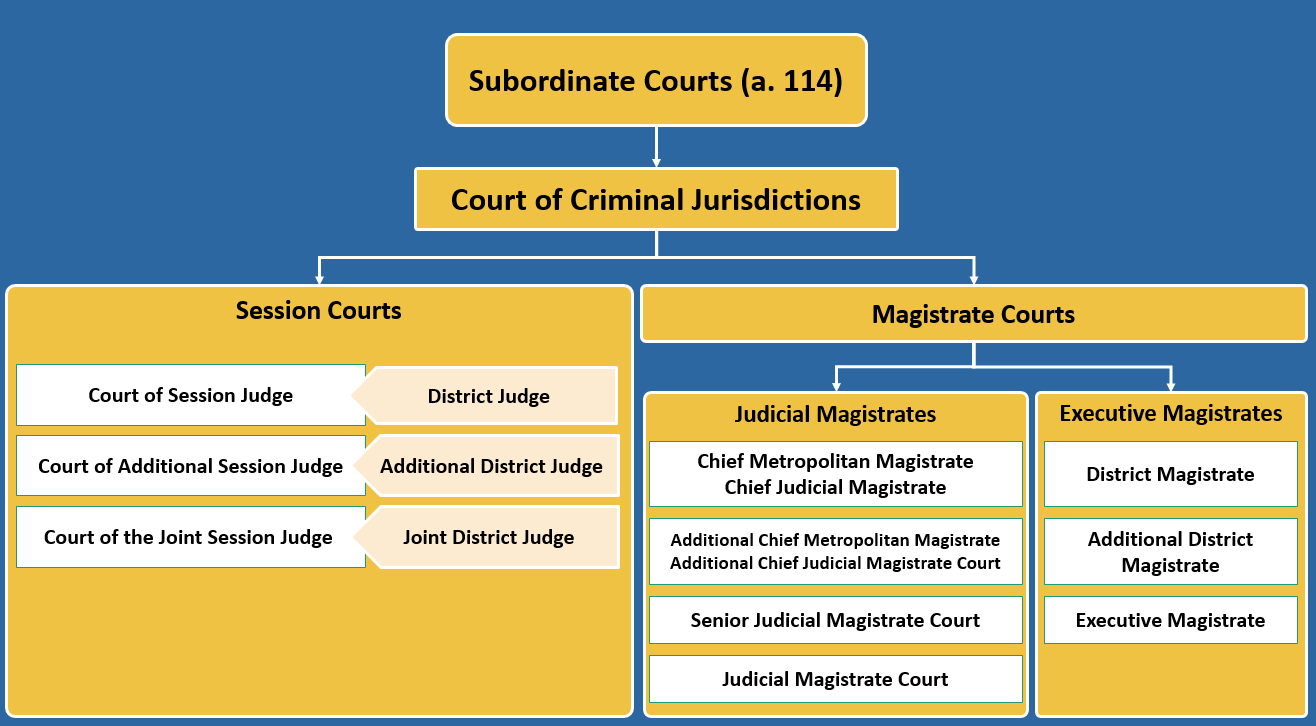Judge organogram
Figure: Judge Organogram
The following diagram contains the detailed diagram of the classes of Subordinate courts in Bangladesh. As we can see the Court of Criminal Jurisdictions is the child of subordinate courts, same as Session courts and Magistrate courts are the child of the Court of Criminal Jurisdictions. The sessions courts have 3 different classes every class has their own Judge for jurisdiction.
1. Court of Session Judge --> A District judge is the head of the court and s/he can perform his/her tasks according to the law of his/ her jurisdiction.
2. Court of Additional Session Judge --> A Additional District judge is the head of the court and s/he can perform his/her tasks according to the law of his/her jurisdiction.
3. Court of The Joint Session Judge --> A Joint District Judge is the head of the court and s/he can perform his/her tasks accrding to the law of his/her jurisdiction.
In this picture the Magistrate courts are defined as the superior court of Judicial Magistrates and Executive magistrates. Judicial Magistrates are defines with 4 classes which are given below:
- Chef Metropolitan Magistrate and Chief Judicial Magistrate
- Additional Chief Metropolitan Magistrate and Additional Chief Judicial Magistrate Court
- Senior Judicial Magistrate Court
- Judicial Magistrate Court
Executive Magistrates
- District Magistrate
- Additional District Magistrate
- Executive Magistrate
Session Court and the Judges power according to the Law.
District Judge :
1. A District Judge may transfer to any [Joint District] Judge under his administrative control any appeals. A District Judge may transfer to any [Joint District] Judge under his administrative control any appeals pending before him from the decrees or orders of [Senior Assistant Judges or Assistant Judges].
2. The District Judge may withdraw any appeal so transferred, and either hear and depose of it himself or transfer it to a Court under his administrative control competent to dispose of it.
3. Appeals transferred under this section shall be disposed of subject to the rules applicable to like appeals when disposed of by the District Judge.
Additional District Judge:
1. When the business pending before any District Judge requires the aid of [Additional District] Judges for its speedy disposal, the Government may have consulted the High Court Division, appoint such [Additional District] Judges as may be requisite.
2. [Additional District] Judges so appointed shall discharge any of the functions of a District Judge which the District Judge may assign to them, and, in the discharge of those functions, they shall exercise the same powers as the District Judge.
Joint District Judge:
The Government may, by notification in the Official Gazette, confer, within such local limits as it thinks fit, upon any [Joint District] Judge or [Senior Assistant Judge or Assistant Judge] the jurisdiction of a Judge of a Court of Small Causes under the, for the trial of suits, cognizable by such Courts, up to such value not exceeding [twenty thousand Taka in the case of a [Joint District] Judge or ten thousand Taka in the case of [a Senior Assistant Judge or six thousand Taka in the case of an Assistant Judge]] as it thinks fit, and may withdraw any jurisdiction so conferred:
Provided that the Government may, by notification in the Official Gazette, delegate to the High Court Division its powers under this section.
Magistrate Courts and their power
1. The Courts of Magistrates may pass the following sentences namely:-
(a) Courts 17[of Metropolitan Magistrates and] of Magistrates of the first class: Imprisonment for a term not exceeding 18[five years], including such solitary confinement as is authorized by law; Fine not exceeding 19[ten thousand takas]; Whipping.
(b) Courts of Magistrates of the second class: Imprisonment for a term not exceeding 20[three years], including such solitary confinement as is authorized by law; Fine not exceeding 21[five thousand takas];
(c) Courts of Magistrates of the third class: Imprisonment for a term not exceeding 22[two years]; Fine not exceeding 23[two thousand takas].
2. The Court of any Magistrate may pass any lawful sentence, combining any of the sentences which it is authorized by law to pass.
3. The Court of a Magistrate, specially empowered under section 29C, may pass any sentence authorized by law, except a sentence of death or of transportation or imprisonment for a term exceeding seven years.]


No Comments